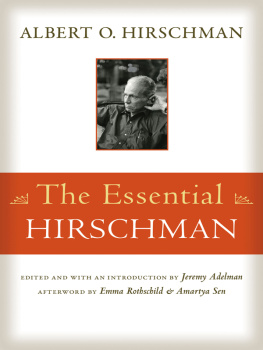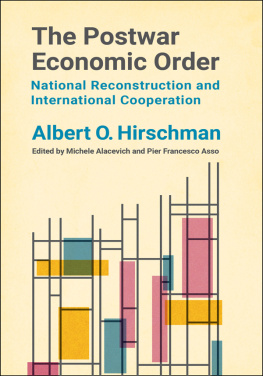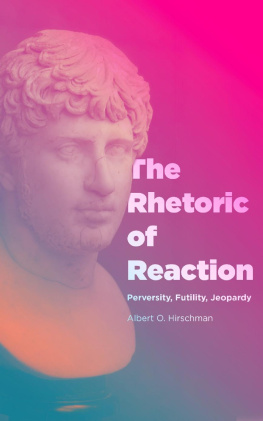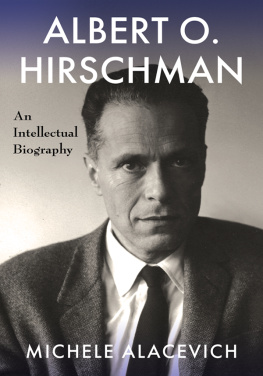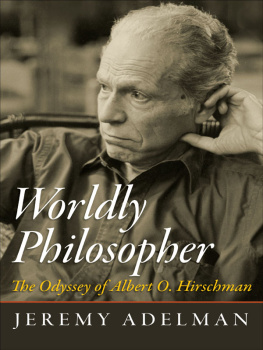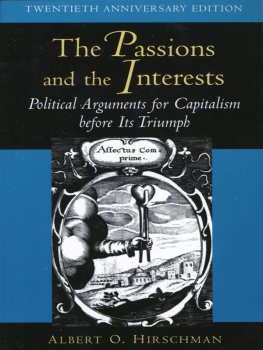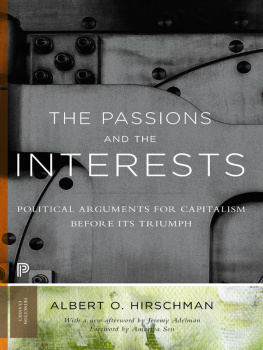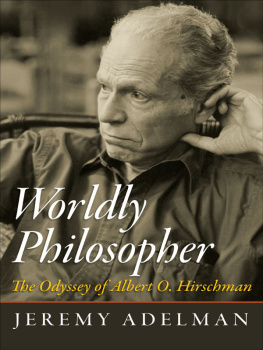
The Essential Hirschman
The Essential Hirschman
Albert O. Hirschman

EDITED AND WITH AN INTRODUCTION BY JEREMY ADELMAN AFTERWORD BY EMMA ROTHSCHILD & AMARTYA SEN
PRINCETON UNIVERSITY PRESS
Princeton and Oxford
Introduction, introductions to individual essays, and Afterword
copyright 2013 by Princeton University Press
Requests for permission to reproduce material from this work should be sent to Permissions, Princeton University Press
Published by Princeton University Press,
41 William Street, Princeton, New Jersey 08540
In the United Kingdom:
Princeton University Press,
6 Oxford Street, Woodstock, Oxfordshire OX20 1TW
press.princeton.edu
Jacket photograph courtesy of Katia Salomon
Jacket design by Marcella Engel Roberts
All Rights Reserved
ISBN 978-0-691-15990-4
British Library Cataloging-in-Publication Data is available
This book has been composed in Minion Pro
Printed on acid-free paper.
Printed in the United States of America
1 3 5 7 9 10 8 6 4 2
Introduction
Jeremy Adelman
S IZE MATTERED TO ALBERT O. HIRSCHMAN. If big is supposed to be betterlarge dams, tall buildings, wide avenues, loud music, big theories, and grand schemes to solve the worlds problemsHirschman was a dissenter. One of the twentieth centurys most original social scientists, he found beauty in the diminuitive, gained insight from the little. While writing a complicated book about the World Bank in 1966, he confided to his sister Ursula that he felt at odds with those who sought big theories to explain everything. I very much like the expression that Machiavelli used in one of his letters for his own constructions, he confessed. These were castelluzzi [little castles, as easy for reality to destroy as for a fecund imagination to construct]that is probably what Eugenio called a piccole idee and the only thing I can really do. Piccole idees, small ideas lesser thoughts that yield great insights, close-up shots that give way to a new panorama, these were touchstones of Hirschmans intellectual style.
The lens to focus on the seemingly unimportant came from Hirschmans brother-in-law, Eugenio Colorni, but Hirschman made the style all his own; it also made him truly unique. The preference for lesser scales did not reflect a lack of ambition. Far from it. Hirschman had a project that transcended the norms of professionalized American social science and defied easy categorization. His was a quest to reveal how acts of intellectual imagination might unlock sweeping possibilities. By finding seams in even the most impregnable structures, one might create openings and prospective alternatives. These were tasks for the intellectual. Oftentimes this meant challenging elaborate certainties, from the doomsdayish or futile sort to the euphoric conviction that one could
Scale was not just about observational preferences or scientific method. It comes across in Hirschmans narrative style as well. Hirschman was more than an original thinker; he was also a master essayist. Nowadays, the heavy monograph or the technical, peer-reviewed article predominate in the world of scholarship. Hirschman wrote his share of those, but where his originality shone through was as the author of essayssmall, sometimes miniature, literary masterpieces. This volume presents a selection of sixteen essays from a lifework of action and observation, advocacy and reflection, the work of a man who respected and used the analytical tools of the social sciences but felt resolutely unconstrained by their boundariesand yet who managed to compress his wide-ranging insights into the tightly bound format of the essay.
Hirschmans essays constitute an art form, how he could use words so economically to say so much. It is not just the breadth of his analysis that readers see at work; it is also Hirschmans commitment to the idea that how we behave (the domain of the psychologist) is connected to the experience of the marketplace (the economists territory), which affects civic and political life (the habitus of the political scientist or sociologist). Moreover, the concepts we use in turn have histories. Hirschmans prose is ever full of reminders that some basic insights came from a day and age in which the human scientist was free of the modern academys disciplineswhich is why he had such an affection for reading, rereading, and citing the classics. The experience of reading Hirschman is frequently to feel poised before a whole tradition of humanistic thought. As the twentieth century unfolded, fewer and fewer intellectuals were able to summon its breadth; our social sciences became increasingly carved into walled provinces called disciplines. Crossing them now often seems forced or heavy handedwhich is one reason why Hirschmans ability to move across the frontiers of knowledge appear so effortless, almost natural. Another reason is because he was simply a gifted writer, and indeed imagined the social sciences as a branch of literature. For the nostalgic among us, Hirschmans prose is a reminder of an earlier age, one that has arguably passed. The essays in this volume bear witness to a propensity to cross from psychology to history, from economics to political sciences, and back againall the while weaving in the works of great literature. It is rare to find a writer in our times so at ease with the modern tools of the social scientist and yet so concerned with the complexity of the human condition that he or she can bring to life the frictions and tensions that come from looking at our world at the junctions of political, economic, and emotional life.
If there were a pantheon for great essayists, Hirschman would stand as one of its finest practitioners. This is because he was a modern alchemist, able to transform the mundane into the marvelous. Few could mix the sharpness of an economists precision with the elegance of a literary imagination. And even fewer could mix them in just the right proportionswhich is precisely what the essay form demands. After all, it has to be short. And none had access to the breadth of linguistic commonplaces and traditions that gave him his range. Hirschmans affection for, and command of, languageshis native German, French, Spanish, Italian, Portuguese, and Englishgave him a repertoire that made him a most uncommon of writers. In an age in which our academic disciplines require ever-greater specialization, redoubled by monolinguality, it is rare to find a scholar who can affect how we think about inequality by writing about traffic, or slip in a quote from Flauberts correspondences to reveal something surprising about taxes.
The essay is more than just a shortened argument that, blown up, becomes a book. It is a form unto itself. Its brevity is an opportunity for an author to pull the veil back on the personal nature of a viewpoint, for the reader to know that there is a viewpoint at all, thereby providing a bridge between practical knowledge and theoretical analysis. In many of Hirschmans essays, readers are urged to follow a passage from Rousseau alongside him. Increasingly, Hirschman himself became the subject of his own essays. Some might see this as an elegant form of narcissism. But there was more to the practice of making the first-person singular a subject; the essay, to Hirschman, was a way of collapsing the distance between author and reader, inviting the reader to trace, close up, the mental working of an author at work, thereby conjoining writerly and readerly experiences.
Over a lifetime, Hirschman was to write great books. This volume brings together a selection of his great essays into the form of a book. But it is more than a sum of parts. The range alone is astonishing. We find that his subjects include how to think about industrialization in Latin America, the imagining of reform as more than repair, the relationship between imagination and leadership, some of the most astute observations about routine thinking about the marketplace, and reflections on how our arguments affect democratic life. Economics, sociology, political theory, intellectual historythese subfields of the social sciences are found here woven together as a compendium. And throughout we find humor, unforgettable metaphors, brilliant analysis, and the elegance of style that gave Hirschman such a singular voice, at once playful and curious, yet provocative and committed.
Next page
